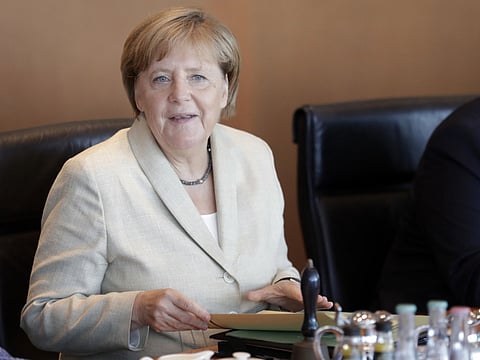Merkel’s commitment to refugees is admirable. But it may backfire
With 46 per cent of voters yet to make up their minds, asylum, migration, integration and related issues are bubbling beneath the surface

There is something hugely admirable in German Chancellor Angela Merkel’s determination to stick to her refugee policy. She has defended it for two years straight in the German political arena and is beating no retreat as she campaigns for a fourth term in next month’s general election. Through a punishing programme of election rallies and interviews, she has insisted that the stand she took in 2015 was the right one for Germany, and she has no regrets. Faced with a similar crisis, she would take the same decisions again.
Her stand draws anger and cries of “traitor” from some of the crowds she addresses — though she points out, rightly, only from a very small minority. And it is also true that while she takes the moral high ground and German national interest in all her public statements, her government has quietly limited some of the generosity. There are moves to make the whole process more efficient and speed up the return of failed asylum seekers. The terms — including length of stay and family reunion — are more restricted than they once were. Merkel is also calling for the distribution of asylum-seekers among Germany’s individual states to be fairer, and there is official acknowledgement that integration and getting the many new arrivals into employment will not be easy.
But the German chancellor is not, as any electoral candidate might be tempted to do, stressing the restrictions over the ethics. Still the parson’s daughter, perhaps, Merkel is accentuating the positive and campaigning on the high moral ground. Then again, what choice does she really have? Any admission of regret or misjudgement would be seized upon by her opponents, chief among them the Social Democrat candidate, Martin Schulz, as evidence of her fallibility and unfitness to remain in office.
With less than four weeks before the election, Merkel and her centre-right CDU-CSU alliance look unbeatable. Opinion polls give them 38 per cent, compared with 22 per cent (and declining) for Schulz’s SPD, with the free-market FDP, the Greens, the far-right Alternative fuer Deutschland (AfD), and the far left, Die Linke, far behind. The question, though, is less whether there is a silent constituency waiting to punish Merkel for her asylum policy — there is — but how big it is and whether it could spring a surprise at the ballot box.
Germans cannot complain about having no choice: The messages of each party are sharply differentiated. Die Linke wants more social security; the CDU-CSU boasts of the strong economy and wants stronger German defence. The SPD wants to address Germany’s largely hidden inequality. In a television interview at the weekend, however, Martin Schulz also took a conspicuously more aggressive and personal approach, accusing Merkel of losing touch with ordinary people, cosying up to the unsavoury regime in Turkey and not doing enough to ensure other EU countries share the asylum burden.
The only party focusing directly on migration issues is the AfD, which has some hard-hitting adverts, including one showing a heavily pregnant blonde woman, with the caption: “If we need new Germans, we can make them ourselves.” Their candidates are also articulate and effective in their media appearances, without coming across as extreme.
No one is suggesting that the AfD could decide this election. The German public is well-inoculated against extremes, especially from the right. But with 46 per cent of voters yet to make up their minds, concern about asylum, migration, integration and related issues is bubbling away mostly beneath the surface, and it is not certain that Merkel’s personal “values agenda” will necessarily win the day.
— Guardian News & Media Ltd
Mary Dejevsky is a writer, broadcaster and former foreign correspondent.


